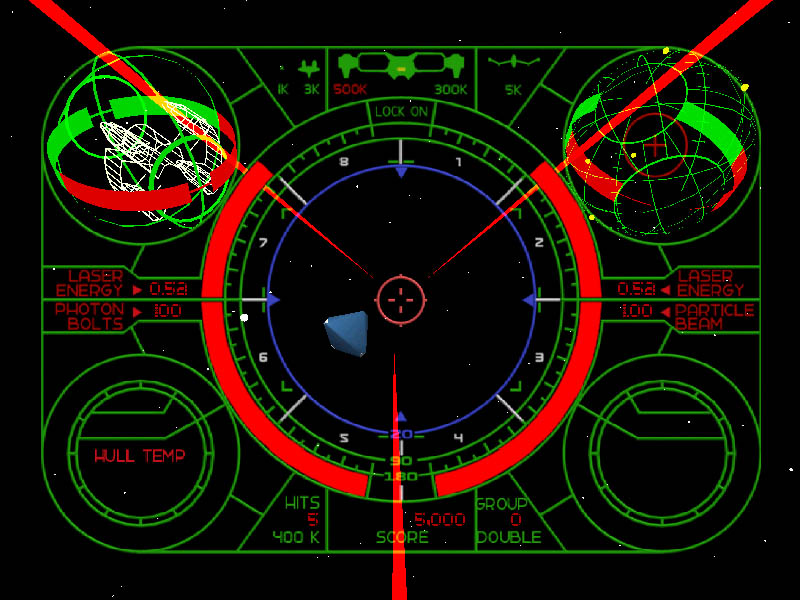The Last Starfighter: The Atari Arcade Game That Never Was
A much-loved film in the 1980s, The Last Starfighter never received an arcade spinoff. It did come close, though...
This story originally appeared on Den of Geek UK.
It sounded like a recipe for sure-fire success: a space opera in the vein of Star Wars, but for the ’80s video game generation. The Last Starfighter told the story of an ordinary teenager whose shooting game prowess saw him whisked away by aliens to fight an interstellar war on the other side of the galaxy.
With some of its effects sequences using the latest in cutting edge computer graphics, The Last Starfighter was positioned as the big summer movie of 1984. Except things didn’t quite work out that way; while The Last Starfighter made money, it wasn’t quite the George Lucas-level blockbuster its producers had expected. As a result, the arcade game promised in the film’s end credits failed to emerge – even though Atari had almost finished it by the time of The Last Starfighter’s release. So what happened?
In the early part of the ’80s, Atari dominated just about every facet of the videogame scene. Its Atari 2600 console had been a phenomenon for years, its range of 8-bit computers were selling relatively well, and thanks to the innovative ideas flowing out of Atari’s arcade division, games such as Asteroids, Missile Command, and Centipede were also a familiar sight in bars and arcades.
From both a technical and commercial standpoint, Atari’s most effective games were its 3D vector machines, which included Battlezone, Star Wars, and its sequel, The Empire Strikes Back. At the time, they offered a sense of speed and immersion that was unparalleled; Battlezone placed the player at the helm of a tank, with a first-person view of the battlefield. Star Wars went one further and placed a generation of young arcade-goers in the cockpit of an X-wing. The action may have been depicted with little more than a few lines,but thanks to their innovative cabinet designs and booming speakers, they really made you feel as though you were in the midst of an exciting pitched battle.

Atari’s Last Starfighter game was envisioned as a successor to the 3D shooting experiences of the company’s earlier Star Wars and Empire Strikes Back cabinets. Like those games, The Last Star Fighter was a shooting game where the player moved an aiming reticule around and shot alien craft out of a star-filled void. The difference this time, however, was that the enemy ships were built out of solid, shaded polygons, giving them a solid presence Atari’s earlier games could only hint at.
The shooting action was made a little more strategic, too, with the player’s controller armed with two laser buttons. Firing both at the same time unleashed a third, even deadlier bolt of energy; the disadvantage of this being that the guns would soon overheat. The best tactic, therefore, was to alternate between light blasts of each laser gun, and only firing both at the same time for larger, better-armoured enemy craft.
Although relatively little footage of Atari’s The Last Starfighter game exists today, what little that remains hints at an unusually fast and smooth piece of programming. It’s certainly much smoother than I, Robot, Atari’s groundbreaking (but little played) arcade game released in 1984, though that had far more polygons to handle on screen at any one time.
To bring all these graphics to life, The Last Starfighter used a Motorola 68000 processor – a piece of hardware that would become ubiquitous later in the decade (it powered such machines as the Commodore Amiga and the Sega Mega Drive), but was still expensive nearer the start of the ’80s. According to arcade-history.com, it was the expense, as well as The Last Starfighter movie’s faltering box-office, that ultimately led to the game’s downfall. With the price of the completed cabinet estimated at $10,000, an unusually high figure for the time, Atari’s higher-ups deemed it too expensive for most arcade owners of the era to stomach.
And so it was that, with The Last Starfighter arcade game around 75 percent finished, the plug was abruptly pulled. Interestingly, the arcade machine wasn’t the only videogame tie-in affected by the movie’s sub-par performance. Atari’s 8-bit home computer was originally set to get a Last Starfighter game, but it was reworked and released as Star Raiders II in 1986.
While The Last Starfighter movie wasn’t a huge hit at the time, its cult success has continued to grow since its release in the summer of 1984, and it’s now regarded as a cult classic. At one point, there was even talk of a TV spin-off, The Starfighter Chronicles.
Nor has Atari’s ill-fated arcade machine quite gone away. While the original never emerged, a studio called Rogue Synapse has created a faithful remake of The Last Starfighter’s laser-blazing action – and best of all, you can download it for free. Unfortunately, you’ll have to build your own futuristic-looking arcade cabinet.